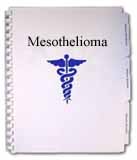|
Mesothelioma and Lung Cancer News - Return to Menu
Mesothelioma deaths to peak by 2015, UK
19 Feb 2005 - Deaths from mesothelioma, an asbestos-related lung cancer, will peak within ten years in the UK and then fall to a much lower level, according to new figures published in this week's British Journal of Cancer*.
Mesothelioma is a type of cancer in the lining of the lungs or the lining of the abdomen. It is thought that the majority of cases are the result of exposure to asbestos, but the disease can take up to sixty years to develop.
Mortality in Britain rose from 153 deaths in 1968 to 1,848 in 2001 and is still increasing, but the new study suggests the rate will begin to decline by 2015.
Researchers from the Health and Safety Executive (HSE), together with Professor Julian Peto of the London School of Hygiene and Tropical Medicine and The Institute of Cancer Research, have improved on previous forecasts by taking account of the changing patterns of exposure to asbestos following the sharp reduction in asbestos use around 1980.
Professor Peto says: "The peak in mesothelioma deaths will be earlier and at a lower number than formerly thought. The abrupt reduction in asbestos exposure in 1980 has altered the lifelong patterns of exposure that people have experienced. This makes the previous age-related models inaccurate.
"Our new model for predicting mesothelioma mortality rates is more complex and takes account of the varying exposure to asbestos of different age groups at different times of their lives."
For example, men born around 1920 who entered the construction industry would have had an increasing level of exposure to asbestos throughout their career. But for men born around 1950 the pattern of exposure would have been completely different.
Early in their career, asbestos exposure would have been higher than in earlier generations, but their exposure would have abruptly dropped at about the age of 30 when asbestos use virtually ceased.
Mortality from mesothelioma in younger men has already been observed to be lower than in previous generations, which adds weight to the accuracy of the new model. However, uncertainties remain as to the future of mesothelioma mortality beyond 2020.
Professor Peto explains: "We've assumed that exposure to asbestos has now reached a negligible level, but we don't know that for certain and it won't be clear from the statistics for thirty years.
"We are currently starting a study of lung samples from young men operated on for a collapsed lung. This will give us a snapshot of the current asbestos exposure without having to wait."
The study predicts the peak in mortality will come between 2011 and 2015, the highest number of deaths per year being between 1,950 and 2,450. After this peak, the mortality rate is expected to fall rapidly to a background level, depending on what residual exposure to asbestos, if any, still persists.
Professor Robert Souhami, Executive Director of Policy and Communication at Cancer Research UK, which owns the British Journal of Cancer, says: "A key part of our work is to monitor incidence and mortality rates for different types of cancer. It helps us to anticipate the future cancer burden, which is essential for planning in the health services.
"Mesothelioma is a devastating disease. This study suggests that mesothelioma will be a much rarer disease for the next generation, and it clearly highlights the benefit of preventing cancers by removing specific risk factors such as exposure to asbestos."
* Hodgson, J.T. et al. (2005) British Journal of Cancer
ENDS
Notes for editors
Mesothelioma UK, the National Macmillan Mesothelioma Resource Centre - https://www.mesothelioma.uk.com - has a dedicated helpline for information: telephone 0800 169 2409 or email mesothelioma.uk@uhl-tr.nhs.uk.
Visit https://www.cancerhelp.org.uk for clear, easy to understand information about mesothelioma.
There were 2,057 new cases diagnosed and 1,848 deaths from mesothelioma in 2001. Around 85 per cent of cases are diagnosed in men.
The five-year survival rate for mesothelioma is about 5 per cent: this means that only 1 in 20 people with mesothelioma are still alive five years after diagnosis.
For up-to-date cancer statistics, visit our website: https://info.cancerresearchuk.org.
https://www.medicalnewstoday.com/medicalnews.php?n
ewsid=20158
Exelixis begins mid-stage trial for lung cancer drug
Posted by: annenierinck
Aug 03, 2006 - Exelixis has initiated a phase II clinical development program for its investigational drug XL647 in patients with metastatic non-small cell lung cancer.
XL647 is an orally bioavailable small molecule inhibitor of the HER2, EGF, VEGF and EphB4 receptor tyrosine kinases (RTKs). Although these individual RTKs are targets for currently approved therapies, XL647 was designed to potently inhibit all three targets simultaneously.
The trial will be conducted at up to 15 clinical sites in patients with advanced (stage IIIB or IV) non-small cell lung cancer (NSCLC) who have not previously been treated with chemotherapy.
The primary objectives of the study are to determine the response rate and the safety and tolerability of XL647. Secondary objectives include assessment of progression-free survival, duration of response, and overall survival, and characterization of pharmacokinetic and pharmacodynamic parameters of XL647.
"We designed XL647 to potently inhibit EGFR and VEGFR, as well as HER2 and EphB4. We believe that simultaneously inhibiting this spectrum of targets may provide greater efficacy than has been achieved to date by inhibiting these targets individually," said Dr George Scangos, president and CEO of Exelixis.
|

































